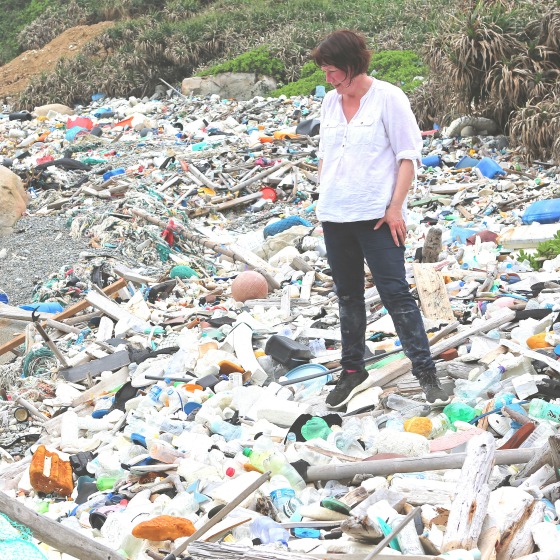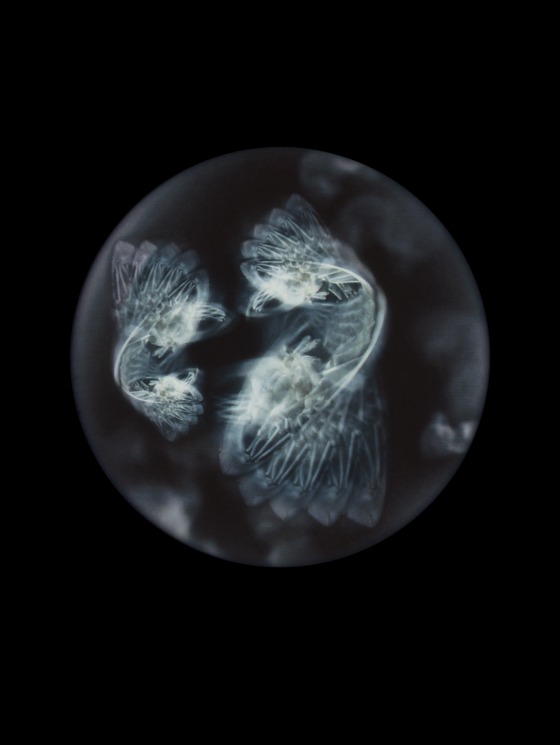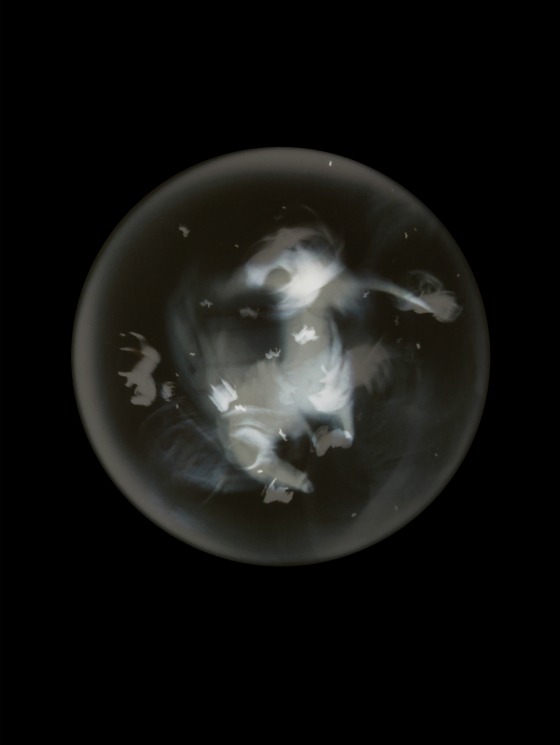Thought-provoking images created by a De Montfort University Leicester (DMU) graduate have been shortlisted for an international prize with a 100,000 Swiss francs [£81,210] top prize.

Mandy on Lap Sap Wan beach, Hong Kong, collecting items for her ‘Hong Kong Soup: 1826’ series. The beach, nicknamed ‘rubbish’ by the people of Hong Kong, is 12ft deep in detritus in parts
The Prix Pictet award is by nomination-only with 300 selectors worldwide picking just 12 people from some 700 photographers for its final shortlist.
And among the hopefuls for this year’s award is DMU Photography MA graduate Mandy Barker.
Mandy, who graduated from DMU with a distinction in 2011, is the only Briton among this year’s finalists and just the seventh Brit to make the shortlist in the award’s nine-year history.
Her series of 25 images, ten of which were submitted to the Prix jury, is entitled Beyond Drifting: Imperfectly Known Animals and will be released as a book this May.
The Hull native, who now lives in Leeds, said: “It is an honour to be shortlisted alongside outstanding photographers that convey other issues of sustainability. I have been nominated twice in the past [2013, 2012] and that in itself was a great achievement, I never imagined it would lead me to being shortlisted.”

Ophelia medustica. (Pram wheel). Specimen collected from Glounthaune shoreline, Cove of Cork, Ireland, 2015, Series: Beyond Drifting: Imperfectly Known Animals, 2015
Mandy’s images are a variation on a campaigning theme: for several years she has used her photography to raise awareness about plastic pollution in the world’s oceans to expose the harm it is causing to marine life and, ultimately, us.
Mandy said: “The series highlights scientific research that plankton are ingesting microplastic particles, mistaking them for food. At the base of the food chain, plankton are a crucial source of sustenance for larger creatures. The harmful impact of plastic on marine and human life is a vital concern.”
RELATED NEWS
Explore the DMU campus online
DMU student's photo chosen as one of the best student pics of the year
Graduate appears on BBC's Countryfile - and says success is down to studies at DMU
Describing the meaning behind the images, Mandy said: “The work refers to the pioneering observations made by marine biologist John Vaughan Thompson in Ireland in the 1800s.
“The images show recovered plastic debris, creating photographs that mimic microscopic samples. I gave the ‘specimens’ new scientific names with the word ‘plastic’ hidden within their title. The work represents the degradation of plastic particles in the natural environment by echoing earlier scientific discoveries when organisms were free from contamination.
“Movements recorded during several seconds of exposure result in the blurred images that represent plankton drifting in water. Film grain is intentionally visible, alluding to microplastic particles being ingested. They were captured on expired film with faulty cameras to highlight the imperfection of both technique and subject matter.”
To hark back to Thompson’s discoveries, Mandy recovered the plastic objects from Cobh in Cork Harbour, off Ireland’s south coast, which was where Thompson made his observations. The images were taken as part of an artist’s residency at The Sirius Arts Centre in Cobh in 2014.
She added: “During my childhood I always enjoyed being by the sea and collecting natural objects such as driftwood and shells. Increasingly over the years these natural objects have been taken over by man-made waste, especially plastic. I began to notice household appliances such as fridge-freezers, computers and TVs on the beach and begun to wonder how they got there.
“I felt this was an environmental concern that others should know about and this is what stimulated my work – to spread awareness to a wider audience.
“The issue of marine plastic is something I am dedicated to and will represent for as long as I can.”

Plamacina retroversta ic. III. (White plastic horse). Specimen collected from Cobh shoreline, Cove of Cork, Ireland, 2015, Series: Beyond Drifting: Imperfectly Known Animals, 2015
It was while at DMU that she first began to photograph plastic debris. She said: “When I began studying for my MA, the brief was to produce a project with a technique and subject matter we had not previously attempted.
“For me, this was to work in a studio, with still life and in colour, which I remember at the time I didn’t really want to do. But by doing this, it pushed me out of my comfort zone and made me try harder to make something new work rather than be complacent with a technique I was happy with.
“The result was my first series using marine plastic debris. During my research, I found out how long it takes plastic to degrade in the sea [up to 20 years for plastic bags, 450 years for plastic bottles and 600 years for fishing lines] and realised this was an issue I would not be able to turn away from.”
Images from all 12 of the shortlisted finalists will be exhibited as part of a global tour of galleries and in a new book called ‘Space’.
“It will be a great honour to be part of such a prestigious tour alongside other outstanding projects that reflect sustainability. The aim of my work is always to engage others around the world with the issue of marine plastic pollution, so being part of this tour will help the message reach an even wider audience,” said Mandy.
The Prix jury this year includes French photographer and 2015 Prix winner Valérie Belin, the Zambian economist/author Dambisa Moyo and Brazilian photojournalist Sebastião Salgado. The shortlist was unveiled at the Musée d’Art Moderne in Paris in November and the winner will be announced by former UN Secretary General Kofi Annan on May 4 at the V&A Museum in London.
The award was founded in 2008 by Geneva private bank Pictet with seven award ‘cycles’ held so far on themes such as consumption, power, earth and water. The Prix aims to use the power of photography to draw global attention to issues of sustainability and the environment.
Mandy’s Beyond Drifting: Imperfectly Known Animals can be seen at the FORMAT Photography Festival in Derby until April 23, at The V&A Museum in London from 5 May until 28 May, and at The Sirius Arts Centre, Cork, Ireland, from 27 May until 2 July.
Posted on Monday 3 April 2017